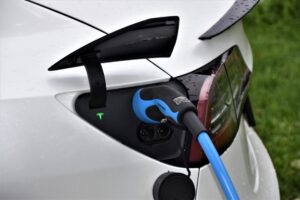Inside the ever-changing market of cars, Electric vehicles are heralding the next era in automotive technologies. It’s becoming more and more likely that cars solely powered on gas will become a relic of the past in our lifetimes. However, the evolutions in electric car technologies don’t just change the way cars are fueled; it also extends to smart automotive solution development including intuitive autopilot, reactionary safety systems, advanced batteries, and computer-based diagnostics.
Automated Driving
In today’s modern age, the phrase electric vehicles (EVs) coincide with the thought of automation. It’s no longer just about making a vehicle run without gas, and now about making it run without gas and the ability to operate automatically. The current most notorious implementation of pseudo automatic driving is none other than Tesla’s autopilot. Although Tesla’s autopilot has been proven as a means to drive completely automatically, the current consumer iterations require the driver to still be behind the wheel and fail to provide a completely automatic experience.
Check here to learn more about the start and growth of Electric Vehicles.
Despite gaining the greatest number of headlines and criticism (justifiably so), Tesla isn’t the only big innovator in the EV scene. We’ll likely see all sorts of software development groups such as GBKSOFT helping pave the way forward in developing innovative technologies and applications for automatic driving systems in the coming years. As the literal driving and motion parts of automation have been mostly solved, the next innovations will come in the form of implemented software. These implemented software and applications will aid in collision detection, navigation, cloud-based systems, and communication with other vehicles.
Lightning Speed Safety
Following suit with the previously mentioned software and applications is the opportunity for the implementation of even faster safety measures. A human’s reaction time can only be so fast and proper innovations to the software inside EVs can easily increase the safety of driving to an insurmountable amount. These systems will include sensors that can react to many different situations and provide many means of crisis solutions such as:
- Reactive Seatbelt fastening and tightening
- Automatic braking systems
- Predictive calculations to avoid collisions
- On the fly repositioning to protect the driver
- Lane-keeping assistance
- Instant distress and medical emergency contact
- Communication with other vehicles to detect hazards
- Blind Spot Sensors
It’s nice to imagine a world with every vehicle on the road having access to smart automotive solutions just previously mentioned. We quickly would see a dramatic reduction in car-related deaths and driving would be just as safe as flying a plane. All the aforementioned safety features already exist; it is just a matter of software implementation and distribution along with adoption from car companies. Automotive software providers have now introduced zonal architecture, which simplifies control units, enables continuous updates, and plays a pivotal role in shaping the future of automotive electronics. Fortunately, it is not far off and most new vehicles could have these systems as early as 2025.
Computer-Aided Maintenance and Repair
Whether through general use or collisions, every car will need to be repaired and maintained. According to Andrew Burnham of Argonne National Laboratory, maintenance and repair costs of EVs is between 11 and 33% lower than your standard gas-powered alternative. The are many reasons for the reduced cost including the fact that electric engines are way less abrasive than combustion engines; as well as user errors such as failing to check and maintain appropriate oil levels simply don’t exist on EVs.
These aforementioned repair cost savings is also aided by computer-based diagnostics implemented inside EVs. These systems allow for a much more simplified approach to diagnosing and troubleshooting car-related malfunctions, which in turn lowers the overall cost of maintenance and labor hours spent on repair. Simple ambiguous warnings such as the ‘check engine’ light will instead be replaced with detailed reports and information about the exact issue the vehicle is having.
Advanced Batteries

Another big boon to the innovation of EVs is the advancement of battery technology. Aside from the obvious which is having no fuel costs tied to your EV, recent battery advancement provides a solid foundation for increasing the performance of everything inside and out of EVs. A hallmark of better batteries is getting the raw throughput required to match and even surpass the horsepower of combustion-based vehicles, on top of having that energy available to you at the drop of a hat. That, coupled with innovative smart battery software to optimize power in the most efficient way possible provides unparalleled quality of life and ease of use for any EV you own or will own in the future.
Key Takeaways
The future is now, and it’s evolving faster than ever. Electric cars will certainly become a mainstay in society and the software innovations along with it will offer amazing benefits to everyone, pedestrian or driver alike. Automatic driving, insane safety measures, ease of repair, and smart battery systems are all things to look at and look forward to in the world of electric automobiles. The effects of these innovations have yet to reverberate in the echoes of history but it will undoubtedly be seen as one of the next best steps forward in modern society.







